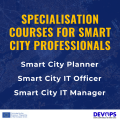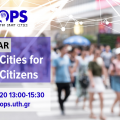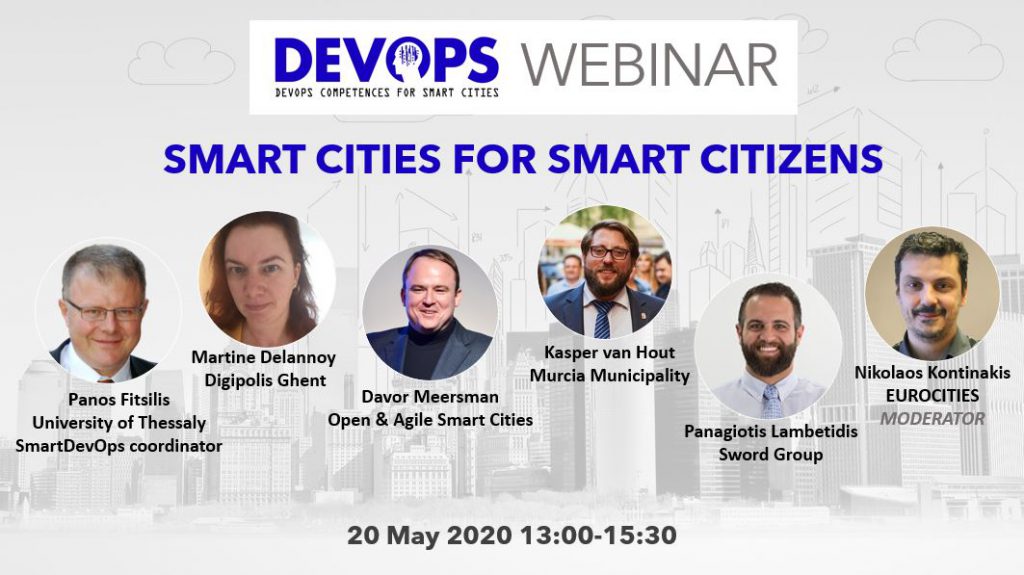
26 May ‘Smart Cities for Smart Citizens’ online event by SmartDevOps project
26 May, 2020
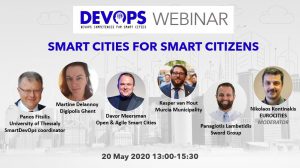
The first webinar hosted on 20 May 2020 by our SmartDevOps project was titled “Smart cities for smart citizens” gathered 70 participants in the Zoom meeting space, with more interested people following the live streaming on ALL DIGITAL YouTube channel.
The webinar was opened by Renato Sabbadini, CEO of ALL DIGITAL, and moderated by Nikolaos Kontinakis, Acting Projects Director at EUROCITIES.
Will future cities still be smart?
Martine Delannoy set the scene by looking at what the future of cities looks like and how we can reach it in a smarter way. Martine then outlined the four phases of evolution of the smart cities approach from smart city 1.0 tech driven approach led predominantly by industry, through smart city 3.0, which is currently being adopted by most cities and which is tech-enabled, involving citizens as co-creators, all the way up to the future city 4.0 which involves all systems and stakeholders in a network, at an equal playing field (citizens, academia, business and civil society organisations).
How to build cities’ capacities for sustainable digital transformation?
Our next speaker Davor Meersman, the CEO of the Open and Agile Smart cities (OASC) network, spoke about how we can create the smart cities of the future. The pace of change that cities can transform themselves as administration is slower than the pace of technological change, and capacity-building efforts such as DevOps are very important in this context. Lack of capacity and skills is the second most important barrier (after finances) to deployment of digital urban platforms, for example. With the same aim, OASC is currently developing the OASC Academy, which will be launched in September 2020.
What skills for smart citizens?
After Davor spoke about the capacity building and skills of people working in or for cities, Kasper van Hout complemented the picture with the other side of the coin – smart citizens’ skills. Kasper works at the City of Murcia, which holds the title of best smart city in Spain, and the co-chair of the digital citizenship taskforce of EUROCITIES knowledge society.
There are many definitions about smart cities, but when it comes to smart citizens, there aren’t that many. Kasper proposed this definition: “citizens that meaningfully engage in the co-creation of their city through new “smart” tools”.
So, what are the skills for smart citizens? Here comes the question about the digital divide. All citizens should have digital literacy in order to be able to interact and be benefit from our networked society. Whose responsibility is citizens’ digital literacy? For Kasper, the responsibility of local governments lies less in what skills citizens need to learn, but mainly in making sure that the apps and digital solutions they propose are easy to use.
What is the DevOps approach?
After a short break, the second part of the webinar focused on the DevOps approach and Smart-DevOps project. Panagiotis Lambetidis, IT and security manager and a DevOps team lead in large projects at Sword group. Panagiotis has specific experience with DevOps practices, and his mission was to bring some light to the DevOps approach and how it can benefit the future smart cities.
He explained what DevOps is, starting from what in the business world is called “the wall of confusion” – an approach which divides development and operation teams in silos, which is not an efficient way to work. DevOps aims to address this issue – DevOps is a compound of development and operations and is a methodology where we can combine those two phases to shorten the development life cycle of a software product. It is an agile and iterative approach, where teams from development and operations, and even the business side, can continuously develop, deliver, test and improve products, in order to deliver higher quality products.
He went on to share IT tools that can be used to perform this DevOps approach to any product and mapped those tools to the DevOps tasks they can be used for. Most of the tools mentioned are free. He also listed a number of business challenges that the DevOps approach successfully addresses, as well as a number of benefits.
What is the DevOps project about and how does it contribute?
Our final speaker was Panos Fitsilis, professor at the University of Thessaly with an extensive experience in smart cities and development of deployment of large IT systems, and SmartDevOps project coordinator. He introduced the DevOps project, where universities, networks and IT companies work together to bring the DevOps approach to cities officials and those aspiring to the employed in the sector.
In recent years, many projects have been funded, but most of them are focused on a concrete technology – smart green, smart energy, etc. But insufficient attention has been given to the citizens, how to involve them, how to build their skills, or the skills of the people working in municipalities in order to bring and implement the changes proposed by those innovative projects. Projects should be more focused on the cultural and mindset change. This is the gap that the SmartDevOps project tried to fill with the following aims and objectives:
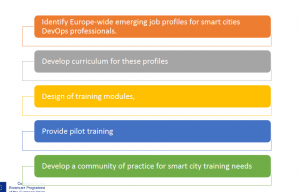
The webinar concluded with a Q&A session, where our speakers addressed questions posted by the audience such as how smart cities can respond to the needs not only of their residents, but also of tourists; what about connecting citizens in a similar way to IoT; how they see tracking apps for COVID-19; digital rights of citizens, and other challenging reflections.
Stay tuned about the project updates through SmartDevOps website, its Facebook @SmartDevOpsEU, and Twitter @devops_smart.



